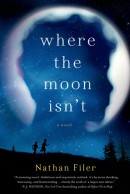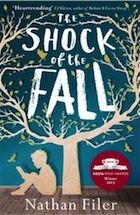2018 School Spending Survey Report
The Debut: Nathan Filer on 'Where the Moon Isn't' | Adult Books for Teens
Author Nathan Filer recently was given the Book Of The Year Award at the 2013 Costa Book Awards for his debut, Where the Moon Isn't (St. Martin's). A former mental health nurse, Filer used his own experiences in this examination of schizophrenia, grief, and guilt. SLJ reviewer Diane Colson caught up with him to talk about writing his process British trivia, and more.
 The voice of Matthew is so believable. He’s smart, and he theoretically understands how his disease takes over his brain. Your writing gives readers such an empathetic, insider view of Matthew’s mental disintegration as he loses that theoretical understanding and is swallowed by his illness. Can you tell us how you are able to so credibly portray the inner workings of schizophrenia? I think there is a temptation for authors who are writing about a character with with mental illness to construct the illness and its symptoms, then bolt a character onto them. My approach with Matthew was to get to know him before the illness takes hold. We meet him as a little boy, and watch him grow up. We see his humor and kindness and intelligence. We get to know him as a writer and artist, as a son and grandson, and brother. All of this comes before his breakdown. I never really set out to portray the inner workings of schizophrenia, but rather the inner workings of Matthew Homes. Schizophrenia is a strangely personal illness; it affects each sufferer differently, drawing upon their own experiences. As Matthew got unwell I thought about the past I had created for him—and how this and his illness might collide. One of the most brilliant aspects of your novel is the structure. Matthew’s cycles through memory and distorted truth serve to create the perfect balance of tension and intrigue. Did you have a plan to make it all work, or did it evolve as you wrote? It's a good question. Now that the book is written it's tempting to look back and imagine that I planned every detail—but in truth, I took quite a few leaps of faith along the way. A novel is such a huge undertaking and I don't think my brain is big enough to hold the whole thing, all at once. The structure is guided by whatever is most important to Matthew at any given moment. He is physically writing out his story, this process takes time and his life continues to move forwards as he writes about it. This means he gets distracted. He might be sharing an event from his past when suddenly the student social worker (the young one with the minty breath and big gold earrings) starts reading over his shoulder—then all he can think about is that. There is an extra dimension of story in the way you include Matthew’s illustrations, and in the way words sometimes stagger across the page. What inspired you to include these features? I think this comes back to my point about Matthew physically writing out his story. In lots of first-person narratives the reader isn't expected to think about how the narrator's thoughts ended up on a page. But for Matthew, writing and artwork are a huge part of his life. In the final chapter he sits at the computer for the last time, with all of his printouts and artwork beside him. This is how I see the piece in my mind: The crumpled stack of Mathew's writing and drawings; the typewriter pages with their smudged ink; the letters from Denise; the words that Patricia cut up and stuck down with Pritt Stick. All left behind in Hope Road Day Centre, on a table in the dark—waiting to be found. The problem, as my publisher explained, is that this can't be stocked in Barnes & Noble. The book in your hands is our attempt at a compromise. As an American, I had to do a bit of research on Bianca from The Eastenders! How did you choose this specific cultural reference to bookend the mystery of Simon’s death? Is there a personal backstory here? When I was writing this novel I always hoped it would get published, but I never for one second imagined that it might get published in other countries. As it happens, I don't even watch The EastEnders. But I know who Bianca is because it's next to impossible to be an adult in the UK and not know; she's in our cultural DNA. In a sense, it is a very British novel. But there is much that's universal. What's that saying? The only thing more striking than our differences... are our similarities. There is a subplot in which medical services that are so important to Matthew’s well-being are cut by the government. Can you tell us a bit about the reality of that situation? I certainly can—but probably not within a reasonable word count for this Q & A. However, I recently wrote an article about exactly this subject for one our national papers. I talk about the time my best friend ended up at the same psychiatric ward at which I used to work.
The voice of Matthew is so believable. He’s smart, and he theoretically understands how his disease takes over his brain. Your writing gives readers such an empathetic, insider view of Matthew’s mental disintegration as he loses that theoretical understanding and is swallowed by his illness. Can you tell us how you are able to so credibly portray the inner workings of schizophrenia? I think there is a temptation for authors who are writing about a character with with mental illness to construct the illness and its symptoms, then bolt a character onto them. My approach with Matthew was to get to know him before the illness takes hold. We meet him as a little boy, and watch him grow up. We see his humor and kindness and intelligence. We get to know him as a writer and artist, as a son and grandson, and brother. All of this comes before his breakdown. I never really set out to portray the inner workings of schizophrenia, but rather the inner workings of Matthew Homes. Schizophrenia is a strangely personal illness; it affects each sufferer differently, drawing upon their own experiences. As Matthew got unwell I thought about the past I had created for him—and how this and his illness might collide. One of the most brilliant aspects of your novel is the structure. Matthew’s cycles through memory and distorted truth serve to create the perfect balance of tension and intrigue. Did you have a plan to make it all work, or did it evolve as you wrote? It's a good question. Now that the book is written it's tempting to look back and imagine that I planned every detail—but in truth, I took quite a few leaps of faith along the way. A novel is such a huge undertaking and I don't think my brain is big enough to hold the whole thing, all at once. The structure is guided by whatever is most important to Matthew at any given moment. He is physically writing out his story, this process takes time and his life continues to move forwards as he writes about it. This means he gets distracted. He might be sharing an event from his past when suddenly the student social worker (the young one with the minty breath and big gold earrings) starts reading over his shoulder—then all he can think about is that. There is an extra dimension of story in the way you include Matthew’s illustrations, and in the way words sometimes stagger across the page. What inspired you to include these features? I think this comes back to my point about Matthew physically writing out his story. In lots of first-person narratives the reader isn't expected to think about how the narrator's thoughts ended up on a page. But for Matthew, writing and artwork are a huge part of his life. In the final chapter he sits at the computer for the last time, with all of his printouts and artwork beside him. This is how I see the piece in my mind: The crumpled stack of Mathew's writing and drawings; the typewriter pages with their smudged ink; the letters from Denise; the words that Patricia cut up and stuck down with Pritt Stick. All left behind in Hope Road Day Centre, on a table in the dark—waiting to be found. The problem, as my publisher explained, is that this can't be stocked in Barnes & Noble. The book in your hands is our attempt at a compromise. As an American, I had to do a bit of research on Bianca from The Eastenders! How did you choose this specific cultural reference to bookend the mystery of Simon’s death? Is there a personal backstory here? When I was writing this novel I always hoped it would get published, but I never for one second imagined that it might get published in other countries. As it happens, I don't even watch The EastEnders. But I know who Bianca is because it's next to impossible to be an adult in the UK and not know; she's in our cultural DNA. In a sense, it is a very British novel. But there is much that's universal. What's that saying? The only thing more striking than our differences... are our similarities. There is a subplot in which medical services that are so important to Matthew’s well-being are cut by the government. Can you tell us a bit about the reality of that situation? I certainly can—but probably not within a reasonable word count for this Q & A. However, I recently wrote an article about exactly this subject for one our national papers. I talk about the time my best friend ended up at the same psychiatric ward at which I used to work.  Can you tell us anything about the change from the UK title, The Shock of the Fall, to the US version, Where the Moon Isn’t? Do you have a preference for either? Actually, Where the Moon Isn't is the original title. It was changed for publication in the UK. And there are others too. In Italy it's Chiedi alla Luna which translates as Ask the Moon. There are “moon” themed editions and “fall” themed editions. I'm hoping for The Fall of the Moon to complete the set... But to answer your question—nope, I don't have a strong preference for the title. For me, the interesting bit is between the covers. (St. Martin's will be releasing the paperback on October 28, 2014 under the British title, The Shock of the Fall.)
Can you tell us anything about the change from the UK title, The Shock of the Fall, to the US version, Where the Moon Isn’t? Do you have a preference for either? Actually, Where the Moon Isn't is the original title. It was changed for publication in the UK. And there are others too. In Italy it's Chiedi alla Luna which translates as Ask the Moon. There are “moon” themed editions and “fall” themed editions. I'm hoping for The Fall of the Moon to complete the set... But to answer your question—nope, I don't have a strong preference for the title. For me, the interesting bit is between the covers. (St. Martin's will be releasing the paperback on October 28, 2014 under the British title, The Shock of the Fall.) 
Credit: Phil Bambridge
How has winning the Costa Award for New Fiction changed your life? Has it affected your writing plans for the future? It's wonderful to win an award, of course. But I didn't set out to write a novel in order to win awards. I wrote because I had a story I wanted to share. The best thing about winning the Costa is that now more people are reading it. I suppose in a sense it does affect my writing plans. But it doesn't affect my writing process—sit at my computer, and try my best. Click here to read the AB4T blog review of Where the Moon Isn't.
RECOMMENDED
CAREERS
The job outlook in 2030: Librarians will be in demand
CAREERS
The job outlook in 2030: Librarians will be in demand
ALREADY A SUBSCRIBER? LOG IN
We are currently offering this content for free. Sign up now to activate your personal profile, where you can save articles for future viewing






Add Comment :-
Be the first reader to comment.
Comment Policy:
Comment should not be empty !!!